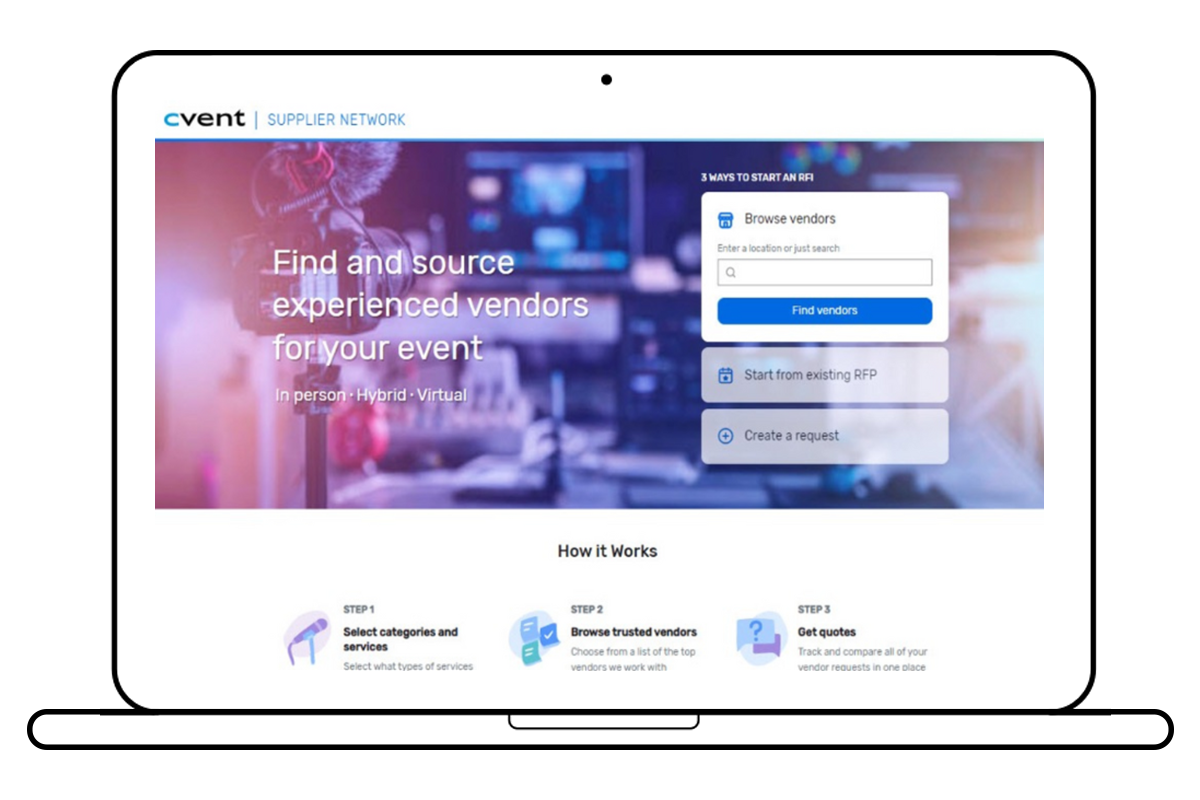Cvent Vendor Marketplace [Review]
Disclaimer: Skift Meetings receives a fee to review this product. The content below is verified for accuracy and aims to provide an objective look at the product’s key features, potential uses, and pricing, among other factors.
Cvent Vendor Marketplace pulls a searchable vendor database with project management tools into one integrated platform. It can be used on its own or alongside any of Cvent’s other event management tools, including its venue sourcing tool, the Cvent Supplier Network.
What Is It?
Cvent’s Vendor Marketplace is a centralized network that helps planners find vendors (suppliers of products and services for the meeting and event industry). It is designed to complement Cvent’s well-established Supplier Network, which is devoted to venues and destinations. Since vendor selection typically happens at a different stage in the planning process and involves a separate set of criteria, Cvent decided to create a dedicated tool for sourcing these products and services.
Much like the Supplier Network, Vendor Marketplace brings together a set of sourcing tools under one platform:
- A database of Cvent-vetted vendors that cater to meeting planners
- A targeted search function that sorts vendors by location and area of expertise
- Automated RFI (request for information) submissions that can be sent to multiple vendors at a time
- A project management dashboard that allows event professionals and their teams to track quotes, team notes, and other insights
- A reporting function that can pull the user’s full history with a given vendor across multiple events, or all the vendors used for a single event
Although Vendor Marketplace is a separate tool from the Supplier Network, the two are designed to work together. Cvent considers both to be part of the larger Cvent “ecosystem”, which aims to bring together planners and suppliers to streamline all aspects of the event planning process. With this holistic approach in mind, Cvent allows planners to connect their group RFP details in the Supplier Network to their Vendor Marketplace search.
Further, planners can organize all of this information under specific event names. By recording and sorting procurement details, these tools help to simplify project management and budgeting needs.
In short, Vendor Marketplace aims to save valuable time for planners by systematizing both the sourcing and management of vendors. This visibility into vendor history can be especially useful when multiple team players across multiple offices are involved.
Main Feature Categories
Free Trusted Vendor Database:
The Vendor Marketplace hosts over 640 listings of vendors that have been vetted by Cvent, with plans to continue to grow and build out this database on a continual basis. Vendor profiles provide contact information and websites, as well as more detailed information such as an “About” text provided by the vendor. Vendors can also add photos and case studies highlighting their areas of strength.


Integration with Cvent Platform:
Planners can access Vendor Marketplace from a few places as they build their event in Cvent, but it is also built into the Cvent Supplier Network, which lists over 290,000 global venues. Integrating these two tools allows planners to efficiently source and manage venues and vendors with the same event details.
Streamlined RFI Submissions:
The Vendor Marketplace works from the same login credentials as the Cvent Supplier Network, which means that you can connect your vendor search to an existing venue RFP. Any relevant information from your RFP will automatically carry over to help fill out your vendor RFI (request for information).
You also have the option to create an RFI from scratch, with the application prompting you to select from a list of standard criteria. These criteria include things like the event format (in-person, virtual, or hybrid) and the number of attendees (broken down into in-person and remote participants).
It’s worth noting that Cvent reserves the term “RFP” (request for proposal) for the Supplier Network, and “RFI” (request for information) for the Vendor Marketplace — with the distinction being that RFIs contain less detail. Because the Vendor Marketplace includes so many different types of vendors and requests are submitted in bulk, RFI forms have to be broadly applicable. Within the Supplier Network, on the other hand, RFPs can outline much more exacting needs because they primarily target one type of supplier: venues.
With that said, Vendor Marketplace does allow planners to attach files and add notes for individual vendors before hitting “Send request” to trigger the automated bulk submission.
Targeted Search Function:
The application first filters your search according to event type — in-person, hybrid, or virtual — before prompting you to further narrow the search by selecting applicable vendor categories.
It’s possible to filter your vendor search based on what services they provide, as well as where they provide them (as opposed to where their head office is located).
Currently, the Vendor Marketplace sorts vendors according to the following product and service categories:
- Accessibility and language
- A/V and production
- Creative services (animation, PR, content strategy, visual design, writing, etc.)
- Destination Management Companies (DMCs)
- Event planning agency
- Event rentals and décor
- Event technology
- Experiences and entertainment
- Food and beverage
- Health and safety
- Incentive services
- Liability Coverage (event insurance, permits)
- On-site event support
- Photo and video services
- Printing and shipping
- Promotional products
- Revenue and finance
- Social impact
- Travel and transportation
Cvent is also actively adding to these categories with the aim of making Vendor Marketplace a one-stop-shop for all the services and products required to produce an event.


When searching across several categories, it’s possible to identify a vendor that fits into more than one category. For example, an A/V and production vendor might also provide photo and video services.
Project Management Dashboard:
Once you have identified potential vendors from your search results, you can select top contenders with one click. Your picks will automatically be collected in your “shopping cart.” When they have their full list ready, planners can then send all of their RFIs in bulk with one click.
Once these RFIs have been submitted, a project management dashboard is automatically created, allowing you — or any approved team member or stakeholder — to view, track, and contribute to the planning process. This feature lists vendors by service/product category, with an interface that makes it easy to highlight whether or not vendors have responded to an RFI. Additional details include the amount they have quoted, whether or not that bid was accepted, and any other relevant information that can be added through the note-making function.
Any information that’s added to this page will automatically be saved: If you sign out and login again, you (or anyone else on your team) will be able to pick up where you left off.
Streamlined Vendor Communication:
Once your RFI is generated and you have narrowed down your list, you can send it (or modify where necessary) to as many potential vendors as you like when seeking bids for a particular service. You can also add attachments to one or all RFIs — for instance, you could share a lookbook with an event rental and decor vendor.
These RFIs will be sent to the vendor(s) via email, together with details about the planner’s contact information and preferred mode of communication.


Vendor Information Management:
Planners manage vendor responses to RFIs outside of the application, but they can track progress with potential vendors within the project management dashboard. Other team members may also be allowed to view and make notes there. In addition to listing quotes from competing vendors, planners have the option to upload files relevant to individual vendor entries. These can include things like pricing sheets and brochures, which will then be available to all team members for both current and future reference.
Beyond preserving vendor bids and contact information, this functionality maintains a record of key business dealings. This includes whether or not a bid was accepted and any other previous experience with a vendor. This archive allows planners to track cost spread and evaluate budgeting decisions. Additionally, it provides insight into your full client history when approaching a preferred vendor for future rate negotiations.
Review
When it comes to the price — free for basic access — the Vendor Marketplace is hard to beat. It’s also the only existing vendor-sourcing tool built into a larger event management solution. In a rapidly changing vendor landscape, the targeted capabilities Vendor Marketplace offers could potentially save many event professionals a lot of time.
As the first-to-market product of this kind, Vendor Marketplace is still in development mode, with significant updates planned in the near future. The product’s core vendor-sourcing tools, however, are already fully functional.
Meeting a Market Need for Simplified Vendor Sourcing
Vendor Marketplace’s vendor categories were developed through a consultative process with several leading industry organizations, and the entire workflow is designed to integrate with other Cvent tools. In other words, the tool is tailored to meet the needs of business event planners, but existing Cvent clients stand to gain the most from it.
Even for those using Vendor Marketplace as a standalone service, the tool can help to simplify project management — especially for a complex project with a planning team that may be based out of many different locations.
The idea for the product stemmed from customer feedback citing greater need for a tool similar to Cvent’s existing Supplier Network, but listing products and services rather than venues and destinations. The market upheavals of the past three years mean that past trusted vendors may no longer be in business or could have merged with other companies, so the need for an up-to-date directory is that much greater. Vendor Marketplace’s detail-oriented user experience also helps to streamline the RFI process while also making complex project management more intuitive.


Cvent also has several improvements in the works, with their next biggest release in 2023 focused on building out a full RFP to proposal workflow similar to the one available on Cvent’s Supplier Network.
Limitations and Workarounds
It’s worth noting, however, that the current model has limited tools for assessing vendors beyond the core categories provided by Cvent. For the time being, participating vendors can neither identify themselves nor be authoritatively vetted as being ecologically responsible, carbon-neutral or negative, owned or operated by an equity-seeking person or community, or committed to ethical workplace conditions including DEI. While there is a tagging tool that allows planners to add labels like “minority-owned business”, these tags are only visible within the individual’s account. Similarly, while users can add their own notes that function like reviews, they are currently only visible within the given user’s account.
Although Cvent plans to make it possible for tags and reviews to be visible across the platform in future, these functions are currently limited to individual accounts. Similarly, keyword searches are not yet possible.
Though the database will continue to be built out, at present it is mainly sourced from the preferred partner lists of existing Cvent clients. While this means, on the one hand, that the vendors a search pulls will have some degree of reliable track record when it comes to delivering services, it also means that you may not find newer or more local companies offering breakthrough services and approaches here.
However, Vendor Marketplace does allow planners to create and add custom vendor listings to their project management dashboard. While the planner needs to find these vendors independently, this feature can be useful for record-keeping purposes.
It is also worth noting that search results are not entirely unbiased: Vendors who have committed to a premium tier will show up with a higher ranking on the page. Additionally, they are allowed to provide more information on their profile. Nevertheless, even those under the basic tier will still be visible in search results — they will simply be lower down on the page, with slightly less comprehensive profiles.
Who’s It For?
The Vendor Marketplace was primarily developed to meet the needs of enterprise planners, association event managers, and third-party agencies who need support for complex event programs. As part of a larger ecosystem of event management tools offered by Cvent, the Vendor Marketplace is designed to help source vetted products and services.
Since the barrier to access this service is fairly minimal — you have to set up a Cvent Planner login account, which is available free of charge — it’s worth considering the potential advantages it holds for any planner that produces or hosts events requiring more than one venue or vendor. Event professionals working on a smaller scale to top enterprise clients may still find that the search filter functionality saves a lot of time.
Planners who have already identified their preferred vendors for an event, and who don’t require the search functionalities that Vendor Marketplace offers, might still consider potential benefits that the project and vendor data management features offer. These advantages may be especially applicable in cases where a larger, dispersed team may be working together to plan and produce an event.
Who’s It Not For?
The Vendor Marketplace was designed with professional event planners in mind. It’s not currently intended to serve clients planning one-off or smaller and less complex events where you may only need to source one or two vendors.
Pricing and Plans
Cvent’s Vendor Marketplace is free for anyone who has created a Cvent login by setting up a planner account. This process is relatively simple and only requires a name, email, telephone number, and the creation of a password. Existing Cvent clients will find that the tool is already integrated within their other applications without any extra subscription fee.
Features
Full Integration with the Cvent Supplier Network
- Having access to both venue and vendor networks makes sourcing more efficient for the planner; the ability to connect event details from a venue RFP and vendor search allows easy management in one tool
Full Integration with Other Cvent Tools
- Searches, filters, data, and even existing RFPs can be easily integrated into workflow when engaging the Vendor Marketplace from other Cvent applications
- There are multiple points of access to specific functions from within the Cvent ecosystem
Targeted Search Functionality
- Vendor categories are designed to align with industry needs
- The thumbnail view of vendors shows additional tags that break down specific products and services in more detail (e.g. an A/V and production vendor might have a tag for holograms and VR/AR)
- Concurrent category and location filters help to efficiently narrow down potential vendors
Project Management Dashboard
- The ability to share event planning information across regional offices, with remote team members, and with third-party clients
- A searchable record of previous and active RFIs, as well a system for tracking their progress/status
- An archive of vendor partners from previous events, including bids, services provided, as well any other relevant notes all in one place
Multi-Regional Search Functionality
- Searches can work with multiple locales serviced by the vendors
- Results will show all regions serviced by the vendor (making it easier to identify those who cater to an international clientele, or alternatively those who are “ma and pa” local businesses)
- Cross-regional searches can streamline planning for hybrid, multi-site, or hub-and-spoke events
- Global searchers are available, although the vendor list is currently weighted more towards North American providers (Cvent is actively expanding its database)
Pros
- Located within the Cvent Supplier Network for Cvent customers to centralize venue and vendor data
- Trusted network of venues and vendors for any event type
- Sources vendors across your total event program
- Streamlines the vendor search process and reduces the need for manual searches
- Semi-automates the RFI process to gather responses quicker
- Simplifies tracking and comparing competing vendor bids
- Provides free access after the creation of a (free) login account
- Keeps past and present vendor data organized and accessible via project management dashboard
Cons
- Vendor Database is currently based primarily on Cvent leveraging top-tier client partner lists, so results may be limited
- Currently primarily oriented towards the North American market
- The tool doesn’t currently feature a keyword search, meaning that planners have to rely on Cvent’s broad vendor categories to narrow down their results
- Though it works internationally, it does not yet support automated translations of vendor profiles into the end user’s language of choice (NB: The Cvent interface itself can be auto-translated)
- Users must register for a (free) Cvent Planner account before accessing the service
In Conclusion
meets an emerging need for event professionals to coordinate effectively and well in advance. It’s a nimble resource, free to anyone who creates a Cvent login.
Attendee and sponsor expectations of event experiences are changing, and this is a tool that may well help planners meet that challenge. Its core value is as a time-saving tool for sourcing trusted vendors across a wide array of industries for in-person, virtual, and hybrid events.
Find out more about the Cvent Vendor Marketplace, and book a demo, here.
Disclaimer: Skift Meetings receives a fee to review this product. The content above is verified for accuracy and aims to provide an objective look at the product’s key features, potential uses, and pricing, among other factors. If you have any questions please use the work with us section.
